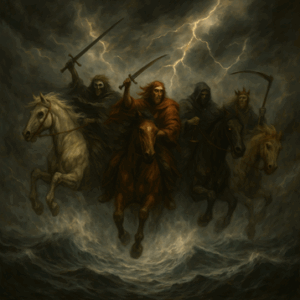This is Faith in Play #95: Horror, for October 2025.
October is traditionally the month when we discuss magic and magic-related subjects, in recognition of Halloween, an important holiday for many gamers. We have a long list of October articles on the subject, including:
- Faith and Gaming: Magic
- Faith and Gaming: Fantasy
- Faith and Gaming: A Concern
- Faith and Gaming: Wizards
- Faith in Play #11: Halloween
- Faith in Play #23: Kralc’s Law
- Faith in Play #35: Seekers
- Faith in Play #47: Magic in the Bible
- Faith in Play #59: Ghosts
- Faith in Play #71: Good Witch
- Faith in Play #83: Spirits

None of those, though, are specifically about horror–and as October arrives, my television is flooded with horror, movies, television shows, even advertising. October is about magic, but it’s often about that cross between magic and thriller, horror.
I have written about horror before, notably on my mark Joseph “young” weblog with #132: Writing Horror (translated for the Places to Go, People to Be French edition) and the requested followup #426: A Christian View of Horror. We’ve also touched around the edges, notably with Faith and Gaming: Bad Things, about the value of dark scenarios. However, as I was looking for a topic for this October, it struck me that Horror has not been a topic here.
As I contemplated what I could write (and honestly I was on this for months) it struck me that those two web log posts got to the heart of the matter from different angles. Horror is ultimately about the complete loss of hope. In a well-told horror story, the critical characters die or suffer similar outcomes, but not before every shred of hope is ripped from them. I make the point that horror doesn’t work for Christians, in that ultimately for us there is always hope–the stormy billows are high, their fury is mighty, but the Lord is above them and almighty. For us, there is no hopelessness, no chance that there is no chance. God is always greater.
That leads to the question of whether Christians can ever do horror. It seems the only way to get there is to create worlds in which God is not almighty, in which it is possible for hope to be lost. C. S. Lewis somewhere suggested that this was not something he could do: if God was God at all, He was God everywhere. Believers always have hope.
Or perhaps that’s the solution: create characters who don’t have hope. In Charles Williams’ Descent Into Hell some of the characters were finding hope, making choices that affirmed life. Others, though, were making choices that brought them further into despair. I listed it as possibly a horror book, and for at least one major character it ends in not only hopelessness but complete loss of identity. So maybe the fictional world does contain God, and He is able to give hope to those who call on Him–but for the characters whose story we are telling, He is excluded.
In fact, we might dare say that for unbelievers, reality itself is a horror story. Without God, the evil is too great, overwhelming. Only God gives the hope that overcomes the darkness.
Previous article: Secular.
Next article: .

Great article, I hope to read more.
Thanks, Kevin. For what it’s worth, there are quite a few links in the article to pieces on related subjects, and there are previous articles in this series, the earlier Faith and Gaming series, and the parallel RPG-ology series (not to mention the mjyoung.net website and accompanying blog), so there’s plenty available.